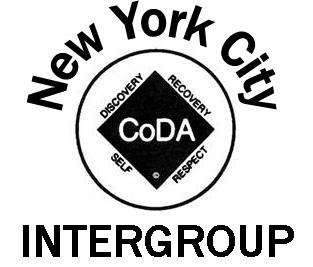 |
A Twelve Step self-help program for Co-Dependents |
| Click on a Step below to see the readings and exercises for that Step. Step 1 Step 2 Step 3 Step 4 Step 5 Step 6 Step 7 Step 8 Step 9 Step 10 Step 11 Step 12 |
CoDependents Anonymous (CoDA) in New York City This web site has been provided by NYC CoDA Intergroup Working the 12 Steps of CoDependents Anonymous (CoDA) © 2005 NYC CoDA Intergroup. All rights reserved. The CoDA 12 Steps and 12 Promises are © Co-Dependents Anonymous, Inc. The Twelve Steps and Twelve Traditions have been reprinted and adapted with permission of Alcoholics Anonymous World Services, Inc. Permission to reprint and adapt this material does not mean that AA has reviewed or approved the content of this publication, nor that AA agrees with the views expressed herein. AA is a program of recovery from alcoholism only – use of the Twelve Steps and Twelve Traditions in connection with programs and activities which are patterned after AA, but which address other problems, does not imply otherwise. Step 2 Co-Dependents Anonymous Step 2: “Came to believe that a power greater than ourselves could restore us to sanity.” Co-Dependents Anonymous Promise 2: “I am no longer controlled by my fears. I overcome my fears and act with courage, integrity, and dignity.” Suggested Reading CoDA Blue Book pp. 31-35; Newcomers may also want to read Chapters 1 & 2. 12 Step Handbook: Step 2 Chapter, pages 11-14. “CoDA 12 Steps & 12 Traditions Workbook – Steps 1,2,3” : Step 2 is pages 14-15. Exercises These exercises can help you work the 2nd Step. In other words, they allow you to get into the feelings and specifics and not just rush through the Step. A time limit can help keep the task manageable; it is a way to set a boundary and feel safe rather than overwhelmed. For example, you may say to yourself, “I will write for 15 minutes tonight.” Set a timer and let yourself stop when it goes off. Consider “book-ending” with your exercises. Book-ending means telling someone, or your meeting, that you plan to do something, then telling them afterwards that you did it. It can help you show up for yourself. Finally, be gentle, and remember that sharing and reading about a Step is also part of working the Steps. 1. Write freely on the 2nd Step for a set period of time. What does the 2nd Step mean to you? Don’t edit or over-analyze. Just write. 2. Write freely about Higher Power. What is that for you? If the concept of a Higher Power is hard for you, why is that? What comes up? Is there a concept that works for you? (For example: Nature, the fellowship of CoDA, God, the Universe, Wisdom, Love, etc.) 3. Discuss your relationship with your Higher Power in your childhood. Did you transfer traits from parents or other authority figures? For example, punishment or abandonment…. What feelings come up? 4. Consider the traits of a Higher Power (“HP”) with whom you would like to have a relationship. Keep a running list. Or try cutting out pictures and images from magazines and making a collage of your “HP.” Listen to others talk about their HP and “take what you like.” Pick and choose different traits. Allow your concept to grow and change. 5. Put aside some time to get to know your Higher Power. Perhaps create a quiet ritual, a visualization or meditation. Consider saying the 2nd Step Prayer (12 Step Handbook page 14) each day for a while. Think of it as developing a friendship, slowly over time. 6. Who in your life have you allowed to be a Higher Power? List the people (or things). Who have you acted as a Higher Power over? How is controlling related to being a Higher Power? 7. Ask yourself at the end of the day: “Who did I make my Higher Power today?” Did you perform tasks to get outside approval? Out of fear of someone else’s reaction? Perhaps a lover, a parent, your boss or friend felt like HP today. (You may have several “Artificial Higher Powers” per day…) 8. List ways your life is “insane.” Then list some of the sanity in your life. Why does the Step say “restore” us to sanity? 9. Exercise: record the way you talk to yourself about yourself. Tape it or write it down, completely unedited. Time it. Record what you actually say, not what you’d like to say, to yourself. Is this a loving and sane way to speak to someone? How would you feel if you heard someone talk this way to a child? 10. Do you try to figure everything out? Is this helpful? How is over-thinking related to Higher Power? 11. Is trust an issue for you? Does it take time to develop trust? How is this related to the 2nd Step? 12. Review the questions in the Workbook (Steps 1,2,3), p. 15. Answer any questions that speak to you. If you want to be on our email list to receive updates on upcoming CoDA events in New York City, please write to anicko2794@yahoo.com For more CoDA info, go to www.codependentsnyc.org or call 646-289-9954 For more information on the program of CoDependents Anonymous, visit the CoDA World Fellowship web site at www.coda.org |